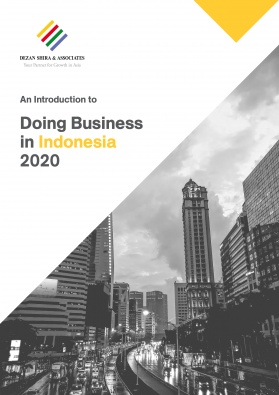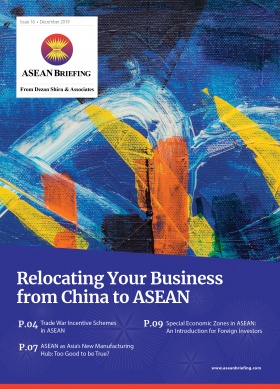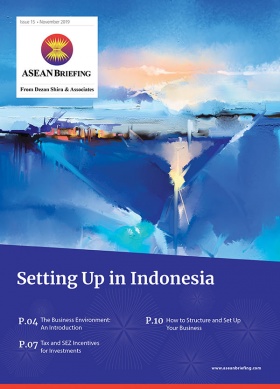Indonesia’s BKPM Issues Guidelines on Electronic Business Licensing
- Indonesia’s Investment Coordinating Board issued regulation BKPM 1/2020, which provides guidelines on the implementation of its electronic business licensing service (OSS system).
- Businesses will now have to utilize the OSS system to apply for business licenses, whereby they will be issued a business identification number.
- The regulation also introduces new classification of business licenses and the capital required for foreign investors looking to engage in certain sectors.
Indonesia’s Investment Coordinating Board (Badan Koordinasi Penamanan Modal – BKPM) issued Regulation 1 of 2020 (BKPM Reg 1/2020) on April 1, 2020, which provides the guidelines for the implementation of its integrated electronic business licensing service, the Online Single Submission (OSS).
BKPM Reg 1/2020 serves to implement Government Regulation No.24 of 2018, which mandates the BKPM agency to implement the guidelines for the issuance of business licenses through the OSS system.
The BKPM is a government agency responsible for boosting domestic and foreign direct investment in the country that can drive the economy and absorb local manpower. Companies looking to obtain a business license will need to utilize the OSS system managed by the BKPM. The system was originally managed by the Coordinating Ministry of Economic Affairs before it was transferred to the BKPM in January 2019.Investors should seek the help of qualified legal advisors to better understand corporate establishment procedures in Indonesia.
How to obtain a business license using the OSS system
The OSS system is a web-based licensing system that was developed to reduce the time required for businesses to obtain a permit and to cut unnecessary bureaucracy.
To obtain a business license, businesses will need to register for an OSS account and attain a business identification number (NIB) before being assessed on the value of their investments.
Getting an account
Businesses must first get an account with the OSS, by uploading the following documents:
- Passport number of the person in charge (PIC) of the business; and
- Deed of establishment of the company.
Obtaining a NIB
The next step is to obtain an NIB, which simultaneously serves as the company’s Importer Identification Number, Company Registration Certificate, Customs Right of Access, and evidence of the company’s Manpower Report (employers are obligated to inform the Ministry of Manpower if they are establishing, transfer, or dissolving a company) This is done by filling in the following data on the OSS system:
- Company identity – includes name, domicile, tax number, management, and shareholder information; and
- KBLI classification data – the Standard Classification of Indonesian Business Fields (KBLI) published by the Indonesia Center for Statistics. The KBLI sets out the specific field (and code), which business is addressed to. The company must determine which KBLI code they fall under and whether this is open to foreign investors.
The OSS system will then validate the data submitted by the applicant.
Business license categories
BKPM Reg 1/2020 introduces new categories of business licenses, which are divided into the following types:
The OSS Agency approving business licenses will consider the type of commitment that the applicant is obligated to fulfil, which depends on their business activity. Examples of these commitments include building infrastructure or employing a certain number of the local workforce.
Type 1
Business/commercial/operating licenses that do not require the business to fulfil any commitments. Type 1 business licenses are effective immediately once issued by the OSS Agency.
Type 2
Business/commercial/operating licensees with technical requirements.
Type 3
Business/commercial/operating licensees with fee requirements.
Type 4
Business/commercial/operating licensees with fee and technical requirements.
Business licenses for Type 2-4 are not immediately effective after being issued via the OSS system. These licenses only become effective after the business has fulfilled the relevant commitments.
Investment value
The regulation also provides the detailed capital required by foreign companies looking to engage in the following business activities:
- Large-scale trading – more than 10 billion rupiah (US$671,000), excluding land and buildings;
- Food and beverage services – more than 10 billion (US$671,000), excluding land and buildings and located within one region/municipality; and
- Construction – more than 10 billion (US$671,000), excluding land and buildings.
Representative office registration
The OSS system can now accommodate businesses that wish to establish representative offices in the country. This was previously done through the National Single Window System.
Company mergers
Businesses undergoing mergers should do so in accordance with a merger deed, which then must be approved by the Ministry of Law and Human Rights. Once this is approved, the OSS system can issue a license for the merger, which must be completed by the surviving company.
About Us
ASEAN Briefing is produced by Dezan Shira & Associates. The firm assists foreign investors throughout Asia and maintains offices throughout ASEAN, including in Singapore, Hanoi, Ho Chi Minh City and Jakarta. Please contact us at asia@dezshira.com or visit our website at www.dezshira.com








